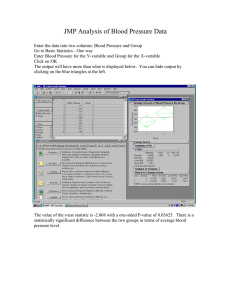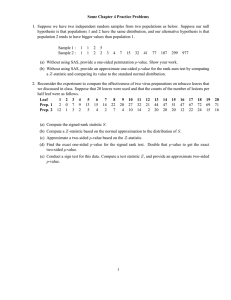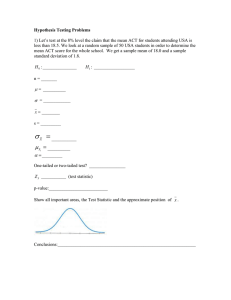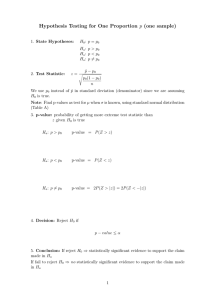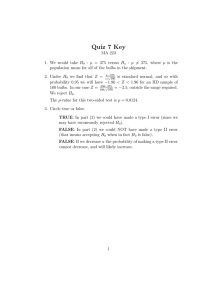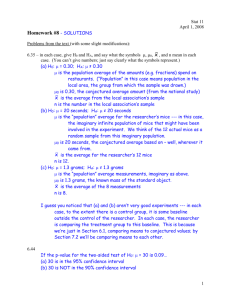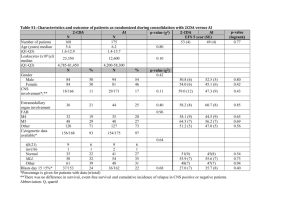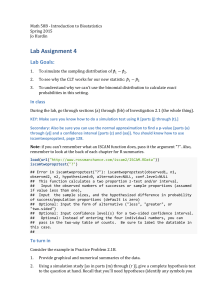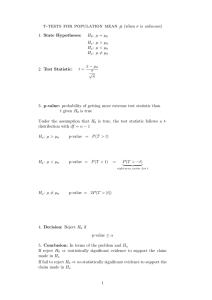Math 1070-2: Spring 2008 Lecture 11 Davar Khoshnevisan April 9, 2008
advertisement
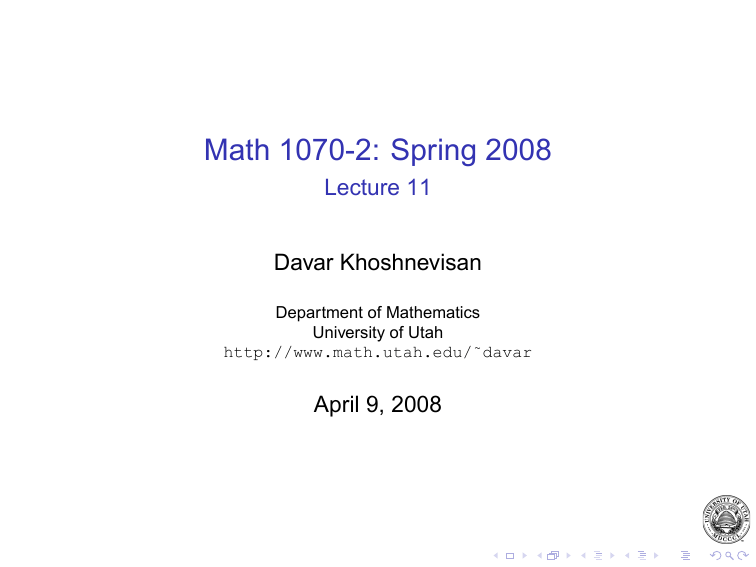
Math 1070-2: Spring 2008 Lecture 11 Davar Khoshnevisan Department of Mathematics University of Utah http://www.math.utah.edu/˜davar April 9, 2008 This week’s reading Only 2 weeks left I Complete the material of chapter 8: I I I §8.3–§8.4 Skip §8.5–§8.6 §9.1 Testing for means I H0 : µ = 0 versus Ha : µ 6= 0, Ha : µ > 0, or Ha : µ < 0 [or more generally] I H0 : µ = µ0 versus Ha : µ 6= µ0 Always check: I I I I Assumptions [quant. var.; random sample; population ≈ normal and/or n large] Hypotheses [of above type] Test statistic: x̄ − µ0 x̄ − µ0 √ = SE s/ n I [≈ t with n − 1 df, if H0 true] P-value: I I I I [µ0 known, etc.] Two-tail for Ha : µ 6= µ0 Right-tail for Ha : µ > µ0 Left-tail for Ha : µ < µ0 Conclusion Anorexia example Example 7, pp. 388–389 I Study different therapies for teenage girls with anorexia I Weight measured before & after therapy I Variable: Weight change = wt after − wt before therapy I n = 29 girls I x̄ = 3.00 pounds, s = 7.32 pounds Anorexia example Continued I Assumptions: I I I Quant. var. Sampling not random [interpret results with care] Normal population [could be . . . tentative] I Hypotheses: [Is the test effective?] I H : µ = 0 versus Ha : µ > 0 0 I Test statistic: t= I 3−0 x̄ − µ0 √ = √ ≈ 2.21. s/ n 7.32/ 29 P-value: [Use t with n − 1 = 28 df] 2.5% = 0.025 > P-value > 0.01 = 1% I [middle] Conclusion: P-value 0.05 → reject H0 [even for Ha : µ 6= 0] Robustness I I If Ha : µ 6= µ0 is two-sided then normality not that important Normality important for one-sided tests. Therefore testing for means OK if: I I I I n large; n small, but population normal; or Ha : µ 6= µ0 is two-sided Anorexia example: We are 95% confident that µ 6= 0 CI for p1 − p2 I Point estimate for p1 − p2 is p̂1 − p̂2 I Fact: s SE = I p̂1 (1 − p̂1 ) p̂2 (1 − p̂2 ) + n1 n2 CI for p1 − p2 : [n1 and n2 large] s p̂1 (1 − p̂1 ) p̂2 (1 − p̂2 ) (p̂1 − p̂2 ) ± z + n1 n2 An example pp. 429–431 I Want difference between placebo & aspirin I n1 = 11034, n2 = 11037 I p̂1 = 0.017, p̂2 = 0.009 I p̂1 − p̂2 = 0.017 − 0.009 = 0.008 [large X] I s p̂1 (1 − p̂1 ) p̂2 (1 − p̂2 ) + n1 n2 r 0.017 × 0.983 0.009 × 0.991 + ≈ 0.0015 11034 11037 SE = = I 95% CI for p1 − p2 : 0.008 ± (1.96 × 0.0015) = (0.005 , 0.011)
